If you’d like to join our online monthly meetup on the afternoon of May 15, please subscribe at the supporter level.
Packing for a weeklong trip to California, to visit friends and then race Saturday’s Miwok 100K, I engaged in rituals to get ready for a race: prepping my hydration pack with gels and comfort items like a small tube of anti-chafe lube, planning a race-day outfit head to toe, and changing batteries in my headlamp.
After all these years of racing, this preparation feels almost automatic. One decision always gives me pause, however: Whether and when to listen to music mid-race, and therefore whether to carry AirPods and freshen up my phone’s playlist.
Having a device plugging your ears during a race is understandably controversial. It’s bad etiquette as well as unsafe to have music playing so loud that you can’t hear other runners call out, “On your left” as they pass. And, music can distract you—you might trip, or miss a turn on the route, because you’re not paying enough attention to the course—or it can alter your pace, prompting you to run faster during an up-tempo song when it’s better to maintain a calm, steady effort.
One of the coaches I respect, Jason Koop, definitively says headphones are a bad idea, and you should not listen to music mid-ultra. “My real problem with using music as an ergogenic aid is that is detracts from one’s own sense of effort,” he writes in his blog. We should tune into our internal sense of perceived effort and pace, he advises, not tune out and distract ourselves with music.
I understand his point and respect his caution. I don’t need music (or a podcast or audiobook) to distract me during a long run or race; I excelled at the weeklong Grand to Grand Ultra each of the three times I ran it totally unplugged. I did not use devices, because that event was off the grid and participants had no way to recharge electronics. I spent hours of those days engaged with my imagination, observing the surroundings, and occasionally singing songs in my head.
But, I do like music mid-race as a special treat and mood enhancer. I also like audiobooks or podcasts for some segments of long training runs. So, how can we manage the audio to avoid the pitfalls that Koop wisely highlights? These are the guidelines I’ve developed for myself and the clients I coach:
Keep your music off, and your ears open, at the start of the race and during early miles when the route is more crowded. This is a time to tune into your surroundings, be aware of other runners passing, and establish a smooth, sustainable pace.
Always pause your music as you enter aid stations so you can concentrate on taking care of business without forgetting anything, and so you can hear and talk to others (remember to thank the volunteers!).
Turn your music off, and use all your senses to be highly aware when you’re running singletrack trail with low visibility (e.g. when trees, bushes, and bends in the trail inhibit your ability to see far ahead, or at nighttime). Be cautious of other trail users, such as mountain bikers, or large animals that might surprise you with a sudden encounter. Headphones are best used on wide-open trails and roads when you can easily see around you and can sense others approaching.
Plan ahead for which segment of the race you want to enjoy music. This avoids the mental chatter of internally debating, “Should I get my music out now?” Generally, in extra-long ultras when I have a pacer later in the race, I save the music for a specific segment of middle miles, before I meet my pacer.
I’m a podcast and audiobook fan, but I don’t advise them for races. It’s too easy to space out and undermine your running performance when you’re following someone else’s conversation or narrative. Save the podcasts or audiobooks for an hour or two of your easy-pace long runs or recovery runs. Race day is a day to stay sharp!
It’s obnoxious to play music out loud on a speaker as you run or hike—the sound carries far and shatters nature’s peace and quiet for other trail users—so don’t be that guy. But, I think it’s OK during training runs to play a podcast or audiobook on a speaker (muting the sound if and when you approach another person). On long solo runs in the wilderness, I sometimes like to play a podcast at relatively low volume on my phone’s speaker, so the sound of a person’s voice comes out of my hydration vest’s pocket rather than directly filling my ears. That way, I can stay aware of other ambient noises and alert to the sound of approaching trail users. This has the added benefit, I hope, of alerting large animals to my presence and scaring them off.
What’s your protocol for listening to music or podcasts/audiobooks mid-run? I’m curious to hear others’ takes on this topic. And if you’re curious to know what music I like, I have three playlists: favorites (songs I can count on to make me feel better), this secondary list of other favorites & new tunes, and mellow songs (mostly ambient music for when I need to chill out and cultivate patience during an ultra).
Packing and leaving home for a week stokes my desire to plan and engage in more meaningful, longer travel. While I’m grateful and privileged to have a few short trips planned this year, to go to ultras and to a niece’s wedding, I’m feeling a bit restless as a homebody. Although we are empty-nesters now and theoretically could travel more, we have made a home and nurtured animals that require care and supervision, complicating the prospect of travel. Plus, traveling abroad is so expensive, it feels excessive.
In spite of those logistical and financial barriers, I’d like to rekindle the traveler I used to be and plan a special trip abroad. My thinking is informed in part by this great article, “A 63-Year-Old Runner Changed the Way I Think About Regret,” about a sub-3-hour marathoner in her 60s who channels regret over past decisions into passion to follow her dreams and push her limits later in life.
The essay made me think about something big and bold my husband and I did 13 years ago, for which I have zero regrets, only gratitude. It makes me yearn to take a leap again.
Let me tell you about what happened when I was about to turn 40, a few days after new year’s 2009.
I was sitting on the stairway landing in our home in Piedmont, a town next to Oakland. The house was a stately Edwardian four-bedroom built in 1909, with ornate molding, high ceilings, and inlaid wooden floors. It’s the home we stretched ourselves to buy in the year 2000, a dream home in which to raise our kids, but it always felt more formal than us. Morgan had successfully co-founded a law firm at age 30, which allowed us to afford this home, and I had put my lower-paying career as a reporter on hiatus to raise our kids. We felt restlessly locked in golden handcuffs because our lives, relationships, and security were tied to his firm and his business partner, and Morgan was chronically stressed.
I had just returned from a long training run with a talented runner (he was the runner-up champ in the Wasatch 100), and we talked about how he felt his parents’ homeschooling had benefitted him. This stirred in me a desire to homeschool my kids, since I wasn’t entirely happy with their school, and my brother had successfully homeschooled his kids. The problem was, I didn’t want to be at home all day.
I sat there pondering an item on my new-year’s to-do list—planning and hosting a lunch—that filled me with uncertainty and mild dread. Several friends in the neighborhood socialized at a local country club, and they had been encouraging us to join. We were missing out on Thursday night barbecues and kids’ playdates at that pool. It’s a golf and tennis club, and neither of us golfed or played tennis. I couldn’t even enter the grounds in my running clothes due to the club’s dress code. And yet, we had taken the first step to join. I was supposed to have some club members to lunch so they could vouch for my character, and then, if I passed muster, we’d pay an exorbitant members’ fee (too embarrassing to reveal here), all for the privilege and price tag of gaining access to barbecues and pool dates.
Somehow, in a matter of seconds, the phrase what the fuck… transitioned to ...am I doing? ... which expanded to, what the fuck are we doing with our lives? Seriously, how had we gotten on this path? It didn’t seem that long ago that we were Philosophy and Journalism majors at UC Santa Cruz getting wasted every weekend. What else could we—should we—do with that money?
Without any preface, I sprung an idea on Morgan: “I think we should pull the kids out of school and travel for a year.”
This idea didn’t come completely out of the blue. We had talked about taking the summer—a whole three months—to travel but felt defeated by the prospect of him returning to a backlog of work, our lives merely interrupted.
Morgan let it sink in. I don’t recall his exact words—I think he tossed off, “Great idea”—but later, he brought it up and we discussed it as a serious prospect. He could leave the firm, we could rent out the house, we could teach the kids their 6th and 3rd grade years as we traveled, and we could use the time to re-evaluate what we wanted to do.
Six weeks later, he broke the news to his partner, who was stunned and disbelieving that Morgan would leave not for the sake of career advancement but simply for family globetrotting. I broke the news to the kids’ school and developed an independent study program so they could follow their grade-level curriculum and re-enter school the following year. We listed our house to rent and dug into savings to buy round-the-world airline tickets.
We committed to travel cheaply and as lightly as we could. I fit all my clothes into a single bag with backpack straps and packed only three pairs of shoes for the year: running shoes, sandals, and some leather walking shoes dressy enough to wear in big cities.
We ran the 2009 Napa Marathon that March, and at the race expo we saw a flyer for the Buenos Aires Marathon happening in October. We turned to each other and said, “We can run that!” Thus, our itinerary started to take shape, based loosely on marathons and other trail-running events around the globe, along with the desire to go to the Southern Hemisphere to chase summer. (Getting babysitters to watch the kids while we ran races would prove to be another adventure, but we managed, and the kids did fine.)
We left on August 15 and started the trip with metaphorical training wheels, road-tripping around the Southwest and spending time with my brother and sister-in-law in Telluride to decompress and transition into this new mode of being, our family foursome together 24-7. Colly and Kyle became each other’s schoolmates and constant travel companions.
We flew to Buenos Aires, rented an apartment, ran the marathon, then on a whim entered a trail marathon in the Andes and spent weeks traveling around there. Then the odyssey continued to Chile, New Zealand, Australia, Hong Kong, Italy, Switzerland, Spain, and England. I celebrated my 41st birthday running a locals’ trail marathon near Florence, no English speakers in earshot, feasting on penne pomodoro at an aid station midway through. We ended up staying in 83 places on five continents over the course of the kids’ school year.
Midway through, we each wrote letters about how we felt the experience was affecting us, and we sealed up the letters to open and read at the end of the trip. Morgan’s read in part:
“I bristle at the term ‘midlife crisis’ for the connotations of a somewhat selfish and sad desire to recapture a moment of youth. ‘Midlife opportunity’ is a much better term. There are many opportunities in life that people never take and can spend the rest of their life agonizing over whether they should have. They key to the midlife opportunity is recognizing that such opportunities actually do exist, and having the guts to make the wrenching changes necessary to seize them. Taking this trip was seizing hold of an opportunity to do something different with the remainder of my life. Now, with half the trip behind me, the question becomes: was it worth it? The answer is an unequivocal yes. It has taken me five months to slowly unwind the feelings that I have about what I left, and to get excited about a different future. The process of travel itself has allowed me to slowly change my focus from the past to the future. Travel forces ‘the new’ upon you on a daily and moment-to-moment basis. Trying to figure out how to order in Spanish, or work a foreign ATM or get a phone card in another country, or figure out what’s on the menu, all combine to make change a constant in your life — and a pleasure. Rather than fearing change, I’ve come to live with it on a daily basis involving all the small things in life. This trip for me has been much less about any particular place or thing, but more about the process.”
Colly, age 11, wrote:
“Some of the words people might think of when they think of this trip are ‘fun,’ or ‘cool,’ or ‘relaxing.’ To me, those words suck. As Mom and Dad would say, those are dull words that don’t describe a tenth of what’s going on. I don’t think there’s a single word that can even start to describe our trip! But, if I had to sum up our trip all in one word, I think that word would be ‘trying.’ We are trying new foods, we are trying new places, every day we are trying new things, and those things don’t always work out but at least we’re trying. Our trip has changed all of us so much. I am reading way more than I would in Piedmont, and we all need less stuff. I think that this trip has without a doubt made us more of a family. We are definitely closer than we’ve ever been before.”
Kyle, age 8, wrote:
“I have been to many places and a lot to come. It feels a long time from rafting [in Colorado at the start of the trip], but I still remember it because it was so fun. I also loved the dulche de leche from Argentina, and I really liked Patagonia with all the dogs. And luging [in New Zealand] was so fun and fast. I hope we get to Australia safe. I really hope I discover new ice cream flavors.”
And the 40-year-old me wrote:
“One thing that hits me is how much I love spending time together as a foursome. I thought I might yearn for more time alone, but the opposite happened: I’m happiest when we’re together, in a small space, such as the car or hotel room. My main hope is that we don’t lose the closeness — the bond — we’ve strengthened during this journey; that we don’t lose the ability to be flexible and free-thinking; that we don’t get stuck in a rut and become more materialistic.”
Funny, I started this post to write practical advice about ultrarunning and ended up time-traveling to a chapter in life I want to remind myself actually happened. We made it happen, even when common sense told us how highly impractical and risky it would be for our finances, safety, and possibly our happiness.
It was the best risk we ever took, and it gives me motivation to plan travel again. Not long term, and not as radically as we did that year, but to explore somewhere new in the coming year. If I don’t, I’m pretty sure I’ll regret it.

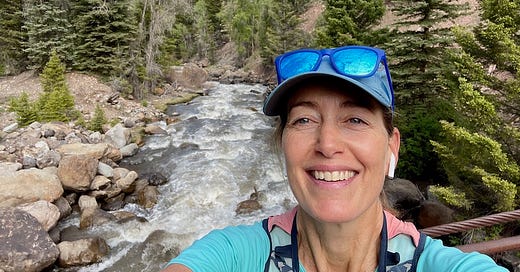

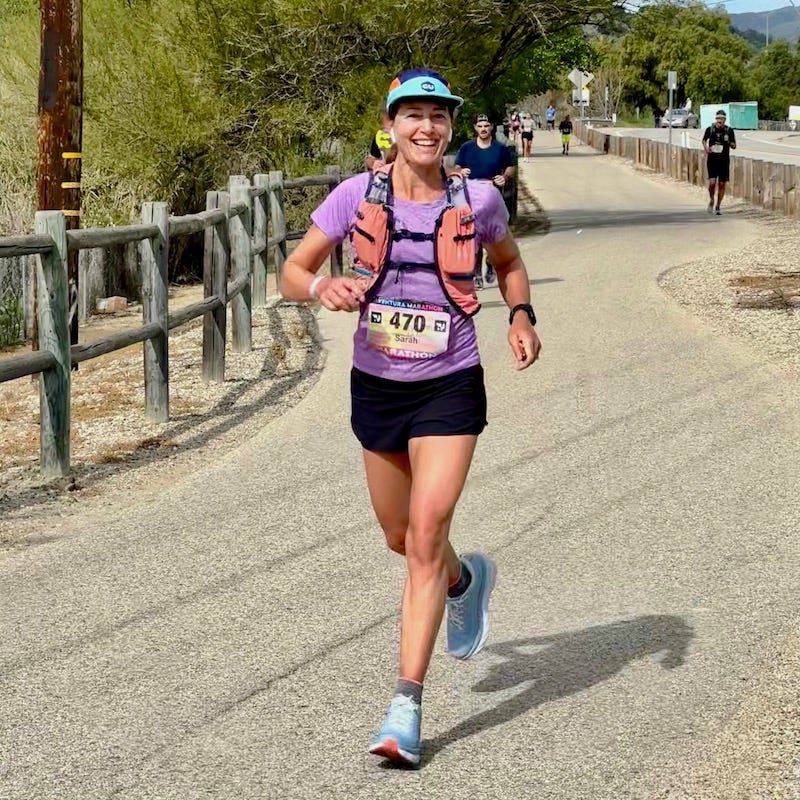

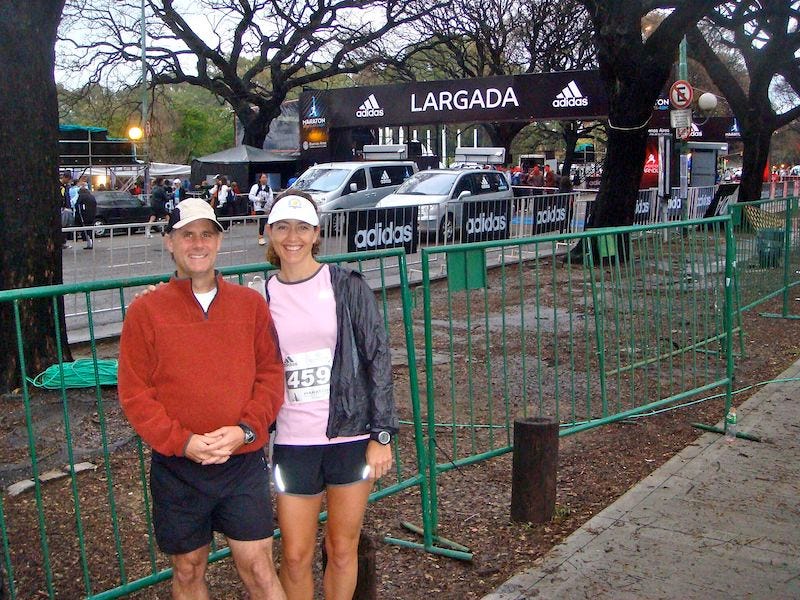
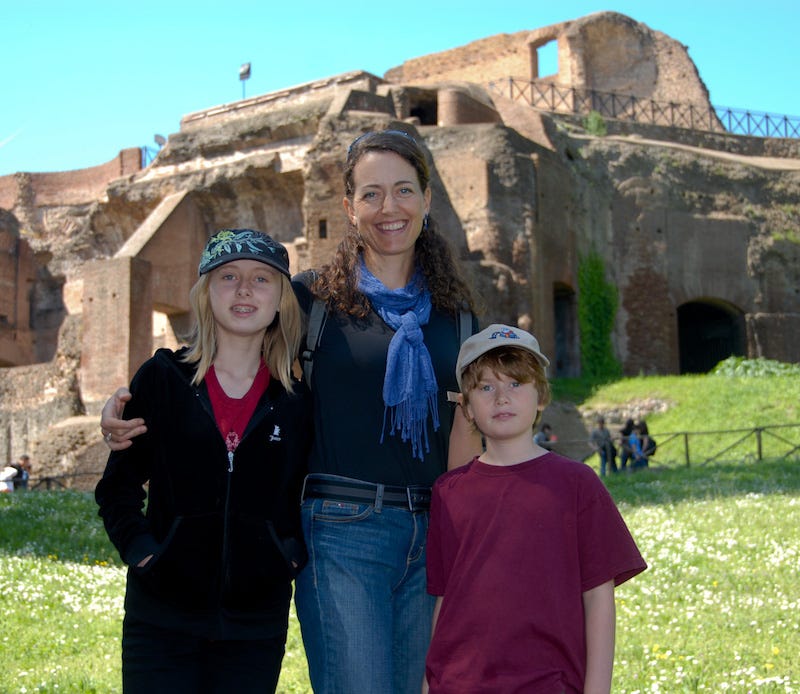
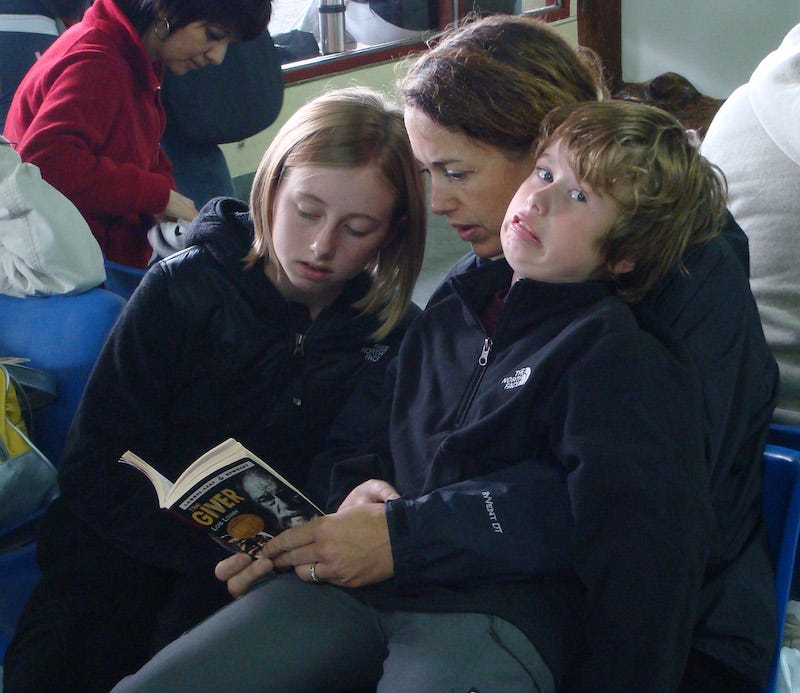
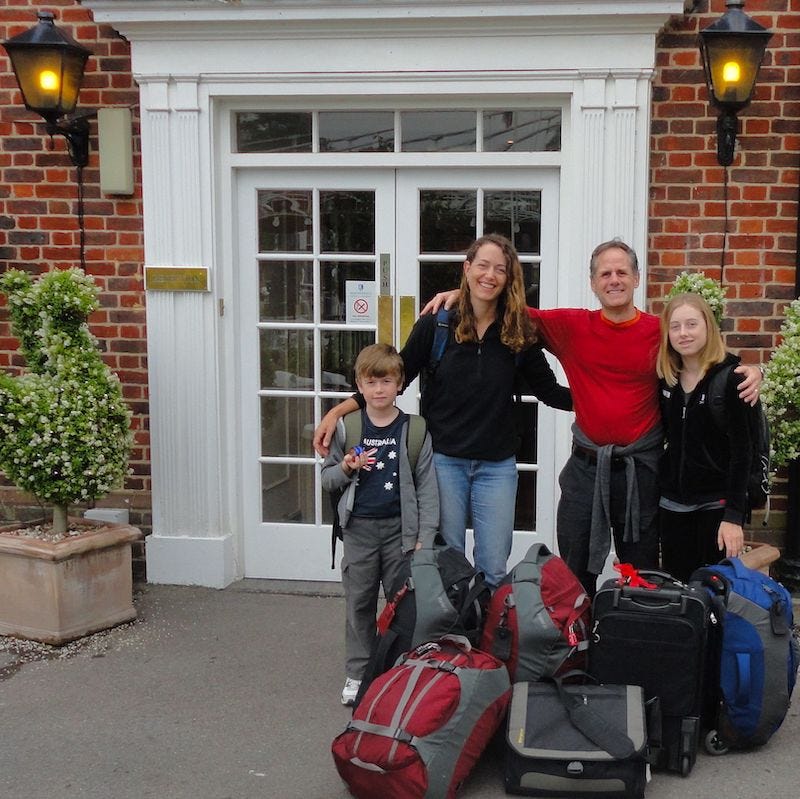
Loved hearing about your travel year. What a wonderful experience to embrace as a family. I also agree with your advice around running. I wish more people used this type of etiquette, so thank you for putting it out there. (One last thing, I grew up in Santa Cruz area & my hubby went to UCSC. He was a math major, but I’ll bet we crossed paths with you guys somewhere back in the day. We left in fall of 1991 for SoCal.
Your post about your family’s year abroad is inspiring. A wonderful reminder that growth and learning comes from being put in new situations. I can only imagine the shift in perspective and appreciation of new ways of being that resulted from that experience.